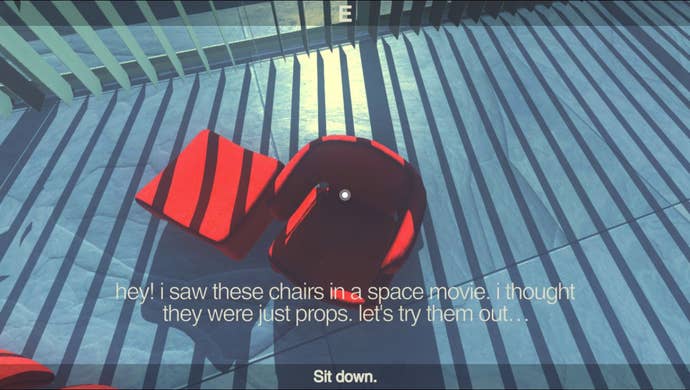Sunset PC Review: Decline and Fall
Tale of Tales' environmental storytelling game definitely offers an experience you've never had before—even if it takes a bit too long to make its point.
This article first appeared on USgamer, a partner publication of VG247. Some content, such as this article, has been migrated to VG247 for posterity after USgamer's closure - but it has not been edited or further vetted by the VG247 team.
In a world where game premises aren't keen on rocking the boat—it seems you're either out for revenge, a dad, or a dad out for revenge—I jumped at the chance to review Sunset, a "walking simulator" (he said affectionately) by indie studio Tale of Tales.
Over the past few years, I've come to rely on these environmental storytelling games to break me out of my gaming comfort zone and provide experiences I don't normally have. Instead of tasking me with worrying about systems, mechanics, stats, and strategies, this genre offers me the chance to slip on a pair of headphones and—with any luck—lose myself within the boundaries of a well-realized world.

In this respect, Sunset does an excellent job. Much like the great Gone Home, Sunset limits the entire game world to a single residence, giving its developers an opportunity to make this intimate space dense with storytelling opportunities. This time around, though, you're not playing a resident of this space; instead, you're The Help. Angela Burnes, Sunset's protagonist, came to the communist utopia of Anchuria for a life better than what the America of the late '60s had to offer. Unfortunately for Angela—and many other people—a military coup has recently rocked the country, forcing her to leave her engineering aspirations behind to take up the menial work that's available. This brings her to the opulent penthouse apartment of Gabriel Ortega, a wealthy man with connections to this new government—to be more specific, it brings her there for an hour every week.
The entirety of Sunset unfolds via these one-hour sessions, where Angela's given a list of housekeeping duties from her wealthy employer. Of course, these tasks rarely take up the entire hour, and, just as with any job out there, she can totally half-ass it—the game's intro even makes it clear that Angela won't be punished for shirking her responsibilities. So, you'll inevitably spend most of this time poking around, snooping, and being a general busybody about the many objects within Ortega's swanky apartment, in an attempt to figure out how the political situation is unfolding beyond the reinforced walls of the filthy rich.
Though many of the objects within the penthouse tell a story via their very existence, Angela herself offers plenty of thoughts via text and spoken dialogue. In what's become standard for a genre that's usually free of any characters other than the players, we learn about people based on their relationships with objects. There's a bit more to it in Sunset, though, as Angela and Gabriel—who's never revealed in the game—use the contents of this bachelor pad to communicate with each other. Sure, there's your standard handwritten notes, but Gabriel also works in subtle ways: an art book open to a particular page, for instance, or a record with some specific meaning placed on his turntable. As each week passes, it's genuinely interesting to snoop around the Ortega estate to see exactly what's changed—especially as Anchuria's political situation gets uglier.
Angela can also communicate with the unseen Gabriel, using the same means he does. While performing your menial tasks, Sunset typically gives you two ways to do it: a "professional" method, and one with a more personal touch. So, instead of making the fancy Asian dinner Ortega requested, you can instead opt to make him a bottomless dish of homestyle mac and cheese. It's Sunset's "morality system," so to speak, and one that determines how your relationship with Gabriel will develop. And, to be honest, it actually surprised me: I went into Sunset trying to keep things professional—which is what a clearly resentful Angela would want—but after a few months passed, I gained genuine sympathy towards my employer for being stuck in a job he didn't like, either—and one with much uglier implications.

There's a certain danger in replicating mundanity: capturing the essence is important, but you don't necessarily want to make the experience itself mundane. And while I wish I could say Sunset avoids this problem completely, eventually, the drudgery of Angela's job becomes exactly that for the player. Even though Sunset limits your time within the apartment, at first making it a race to soak everything in, during some of Angela's weekly visits, there isn't very much to see or do, or any narrative breadcrumbs to maintain interest in the ongoing story.
This problem is exacerbated when Gabriel disappears for weeks at a time due to certain plot events, leaving nothing for Angela to do but drop off his mail and putter around the unchanged penthouse. (Thankfully, you can end your day at any time.) Sure, you can always plop down in Gabriel's easy chair and have Anglea scribble away at her journal, but watching her write out every line, one at a time, loses its novelty fast. Whenever I wanted Angela to write about the situation at hand, I'd usually end up browsing Twitter for a few minutes, then check back into Sunset to review the full transcription on the menu screen.
Regrettably, it's this mundanity that ends up reducing the overall impact of Sunset—a shame, since the outside world ends up intersecting with the inside world in some very cool ways. While the amount of time you sink into Sunset can vary, the credits started rolling for me a little after five hours in; that may not seem all that egregious to you, but the experience could have been a lot more meaningful if it had been shaved down to two or three. That's not to say Sunset is an experience that's not worth having, but if you don't possess the amount of patience its genre often demands, you may find yourself feeling awfully listless. If you can power through its few dull stretches, though, you'll definitely come out the other end with an experience that can't be had with any other game.
InterfaceIt doesn't get much simpler than WASD, pointing, and clicking.
Lasting AppealThe different options presumably give Sunset some alternate narrative avenues to explore, but the monotony and loneliness of housekeeping may not having you raring to jump right back in.
SoundMost of Sunset plays out in the eerie silence of Gabriel's empty penthouse, making the few sounds the leak in from the outside world genuinely interesting.
VisualsSunset goes for a simple, stylized look that's oddly taxing on video cards. Tale of Tales might not be shooting for photorealism, but the world they've created is certainly effective.
ConclusionIn terms of content and premise, Tale of Tales has a winner with sunset; I'd be hard-pressed to think of a game that tackles class, race, politics, and Capitalism so effectively with a light touch. Unfortunately, their attempts to replicate the drudgery of blue-collar labor might have been a bit too effective—certain sections of Sunset had me feeling absolutely listless. It's a problem I wish they would have improved, but definitely not one that should keep you away from this intensely original game.

